#Madame de Murat
Explore tagged Tumblr posts
Text
JACOBIN FICTION CONVENTION MEETING 36: THE GAME OF HOPE (2018)
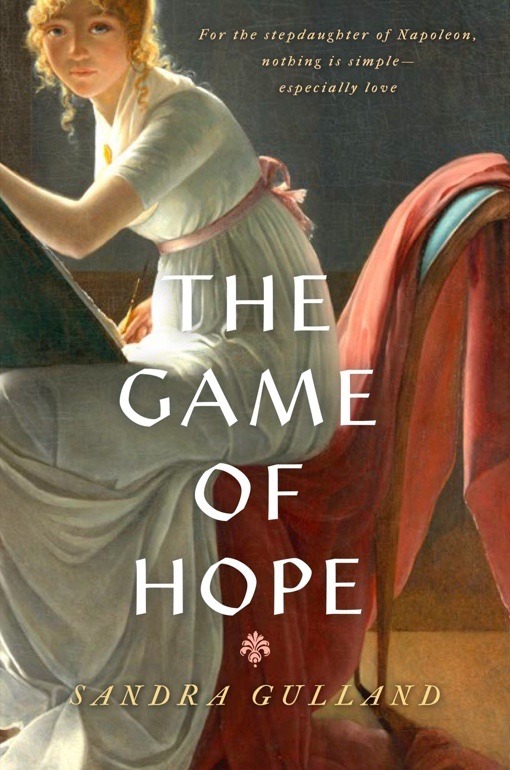
1. The Introduction
Well, hello there, Citizens and Neighbors! I’m alive and back with a review, as promised. (Very happy about it too because I missed you!)
Now, to cut to the chase, @josefavomjaaga was the first person who told me about the novel’s existence, which had me a bit intrigued already due to my constant search for new media to consume and review.
However, my dear friend @tairin helped seal the deal and officially put this particular piece onto my review bucket list, as a physical copy of the book (in Russian) was her present for my birthday last year. I read the book back then but, due to all the other reviews and personal life stuff, kept putting away this particular review.
Fortunately, I finally found free time to catch up on the piece and post it, so here we go.
Before we proceed, here’s a link for anyone who wants to download the book in English. As mentioned, it’s available in Russian too, but Russian-speaking members of my audience will need to purchase the epub or a physical copy to be able to read it. I’m not sure if it’s available in any other languages.
Also, this review is dedicated to @josefavomjaaga , @tairin and @frevandrest ! Okay, let’s. Fucking. Begin.
2. The Summary
“The Game of Hope” tells the story of Hortense de Beauharnais, Napoleon’s stepdaughter, and her coming of age journey, including crushes, rivalries, and her life at Madame Campan’s boarding school for girls.
Although I loathe Hortense with a passion, review material is review material and I was still intrigued by the premise, so let’s see how this premise plays out in the book!
3. The Story
Generally, I enjoy coming of age stories and YA novels and, luckily, this one is no exception. It is melodramatic, but it’s justified because Hortense is a teenager and a dramatic person, so her POV having melodrama is expected.
It’s a slice of life kind of story and most political events happen in the background but still realistically affect the characters, which is realistic and very neat!
Also, this is by far the only book where anti-Frev sentiments don’t give me an urge to flip the fuck out, since Hortense lost her father and almost lost her mother during Frev and is far too naive and young to understand politics! Of course she will think Frev is evil and of course she will believe that being noble would be enough to have her executed!
The pacing is great too. There are some time skips but the author clearly knew when to do them and when to slow down. Now complaints here.
If you are craving a story with typical teenage melodrama involving historical figures, then I guess it’s a book for you.
4. The Characters
I don’t like Hortense as a person here, but as a character she’s realistic and nuanced. She has the selfish and bratty nature that would stick way into adulthood, but she genuinely loves Eugene and her friends at the boarding school. Also her resentment towards her stepfather and the Bonaparte siblings is quite realistic, as from her point of view they’re just asses towards her mother for no reason.
Caroline Bonaparte starts off as a rude bitch (also thanks to Hortense incorporating her own bias), but luckily she becomes more and more nuanced along the way and becomes sort of a frenemy to Hortense. Caroline clearly doesn’t enjoy studying under Madame Campan and wants out of there. Perhaps due to my bias, or because we don’t see her POV, Caroline grew on me more than Hortense.
Eugene (I HAVE to mention him) appears later on in the story and, as expected, is an absolute cinnamon roll.
Josephine is idealized in the story by Hortense, but she isn’t flawless and keeps trying to find Hortense a husband in the beginning. However, she also helps Caroline and Joachim marry, which makes their treatment of her later on a fucking dick move.
Émilie, Hortense’s cousin and close friend, is slightly older and already married (not that unheard of back then), but is still a teenager going through the typical motions common for that age. She is more mature than Hortense and feels trapped in a loveless marriage with Captain Lavalette (no idea who that is).
Campan is very strict but genuinely cares about her students. I liked the part where she has The Declaration of the Rights of Man and Citizen attached to the back of a portrait of Marie-Antoinette and flips the portrait when inspection arrives. Simple, but quite clever!
5. The Setting
No complaints here! Gorgeous descriptions that are very much historically accurate, and Hortense’s POV is conveyed masterfully, which aids the story greatly.
6. The Writing
Simple yet beautiful, without diving too much into purple prose territory and doesn’t shy away from mentioning or implying normal things like periods or sex. I can sense some pearl clutching might happen, but personally I think these topics should be normalized so I don’t complain. Also, my copy graciously included translations of Italian phrases, which is doubly awesome!
7. The Conclusion
Overall, an excellent, overall accurate and believable story! I highly recommend it to anyone interested in learning more about Hortense or just looking for a Frev/Napoleonic coming of age story without too much action.
Alright, on this note, I’m concluding today’s meeting of Jacobin Fiction Convention. Stay tuned for updates, guys!
Love,
Citizen Green Pixel
#french revolution#frev#jacobin fiction convention#frev art#book review#a game of hope#hortense de beauharnais#eugene de beauharnais#josephine bonaparte#napoleon bonaparte#caroline murat#joachim murat#madame campan
57 notes
·
View notes
Text
an incomplete list of things men refused to use when they were first invented, for fear of seeming Unmanly:
wheeled luggage (earliest known example created by Anita Willets-Burnham in 1928; faced pushback from men when the first commercial examples came out in the early 1970s and even into the 1980s)
wristwatches (some claim the earliest known example was made in 1810 by Abraham-Louis Breguet for Queen Caroline Murat of Naples, but this is disputed; at least one example of a ring watch exists from the 18th century, belonging to Madame de Pompadour. had definitely caught on for women, albeit as a novelty, by the mid-19th century; didn't become popular for men until after WWI, wherein soldiers had publicly worn them)
umbrellas, in Europe, for the purpose of keeping off rain (introduced for this purpose- rather than the millennia-old sun protection -around the early 18th century, at which point they were perceived as exclusively for women until around the mid-19th)
372 notes
·
View notes
Text
Party crasher Murat
And now for something completely different... Translated from "Correspondance du Grand Maréchal du palais de Napoléon Ier", i.e., Duroc's correspondence, letter No. 2152:
To Prince Lebrun, Duc de Plaisance, arch treasurer of the empire 4 April 1811 Monseigneur, His Majesty the King of Naples, who left as soon as He received the news of the birth of the King of Rome, arrived yesterday evening at the Tuileries without anyone being notified. As the entire palace was occupied, the Emperor thought he could make use of the quarters of Your Serene Highness to temporarily accommodate the king. As Duke Charles de Plaisance (Lebrun’s eldest son) is on mission and Madame la Duchesse (Charles’ wife) was not at home, they could not be notified in time. Your Serene Highness may rest assured that, on the King's departure, the flats will be returned to the same state they were in when His Majesty entered them.
Everything about this letter is hilarious:
Hi, Lebrun, so sorry, but you see, Murat has just stomped into the Tuileries shouting "Hi, where’s the baby", and we didn’t know where to lodge him and nobody happened to be home at your palace, so… Also, so sorry in case your daughter-in-law walked in on a half-naked Murat admiring his ass in her mirror – we had tried to contact her! Also, we will clean up all excess feathers and pink glitter as soon as Murat’s gone. Promise!
#napoleon's marshals#napoleon's family#joachim murat#napoleonic era#paris 1811#geraud christophe michel duroc
40 notes
·
View notes
Text
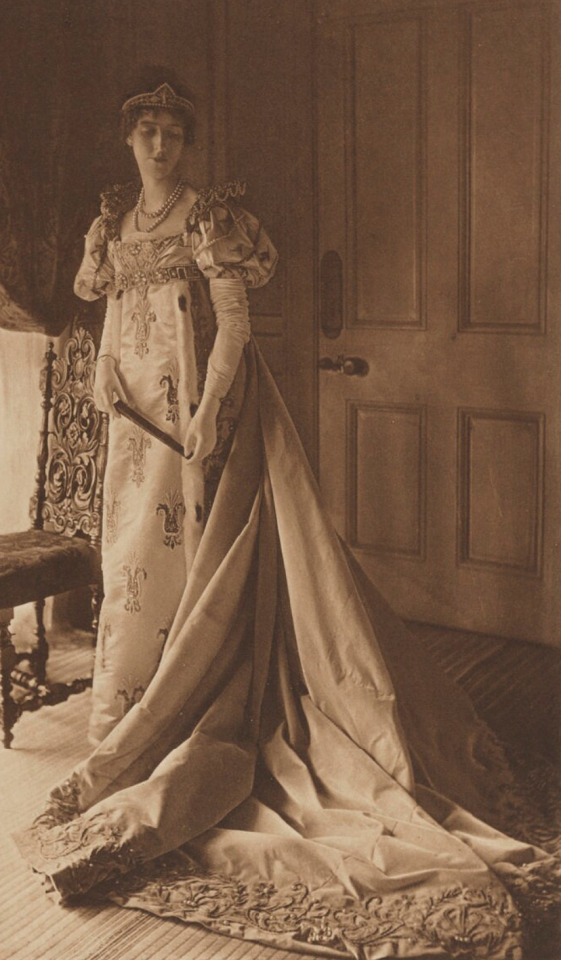
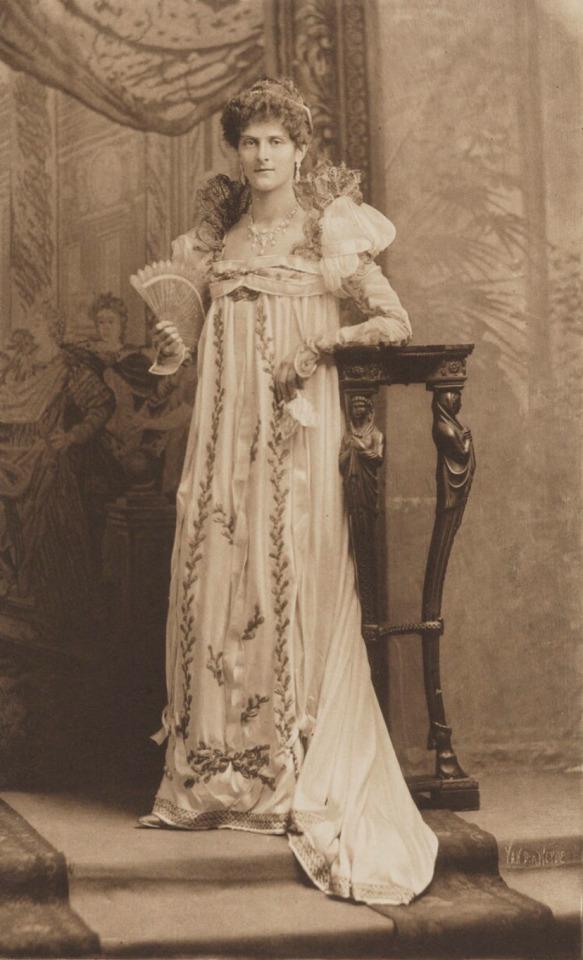
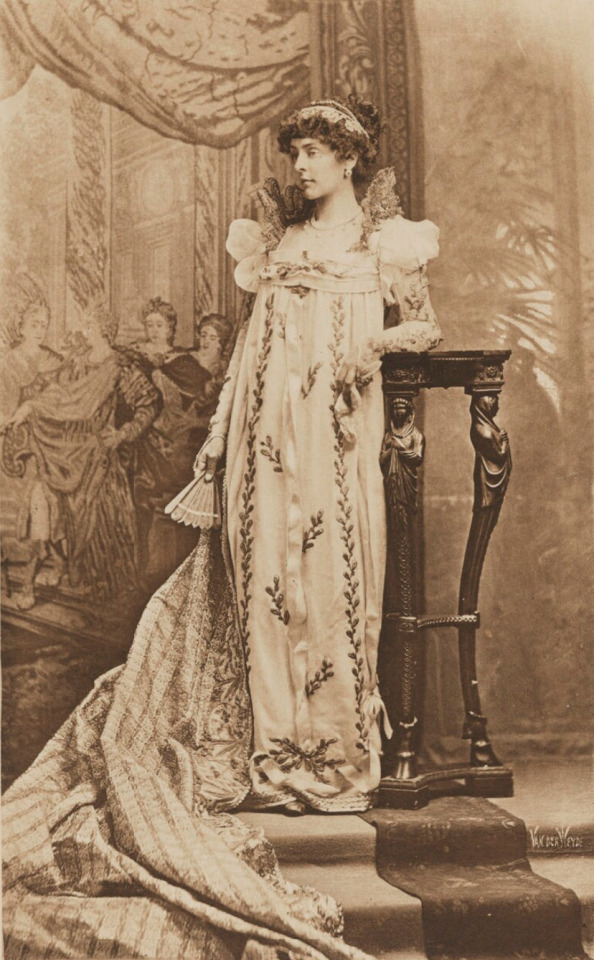

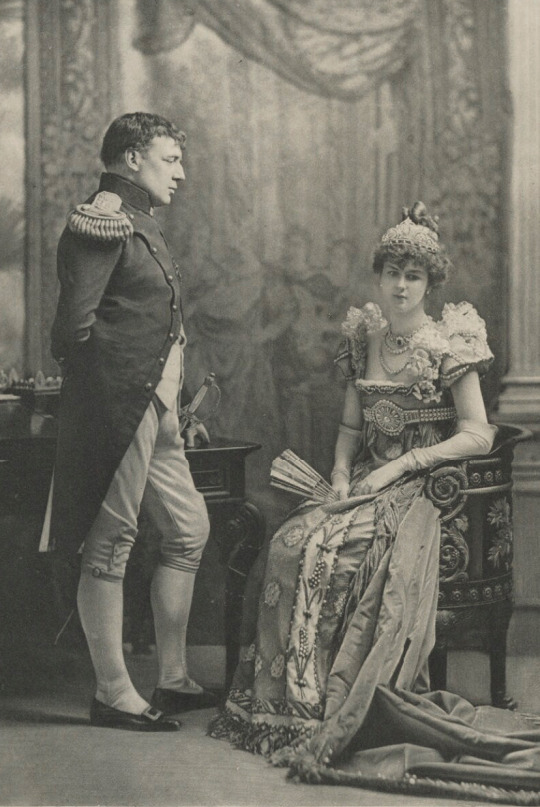

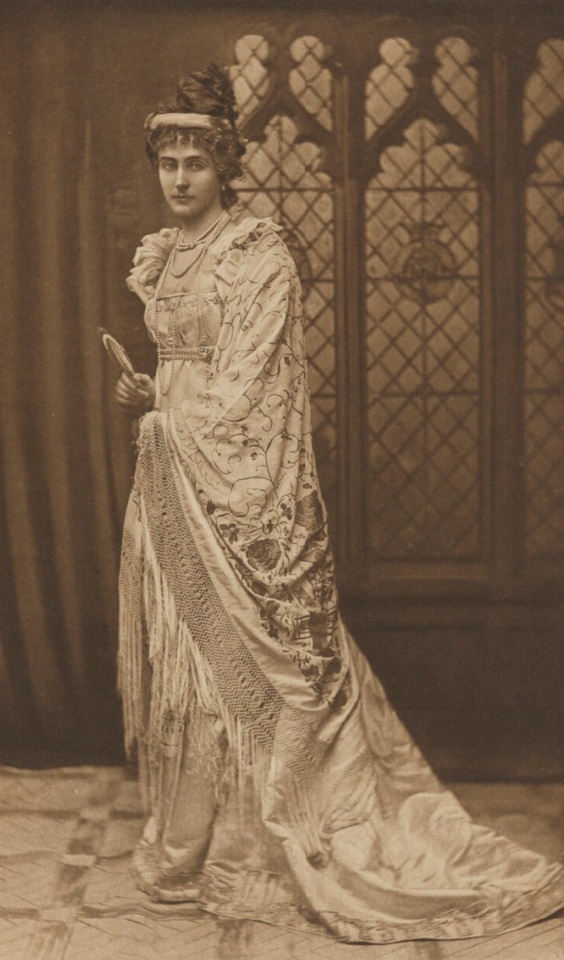

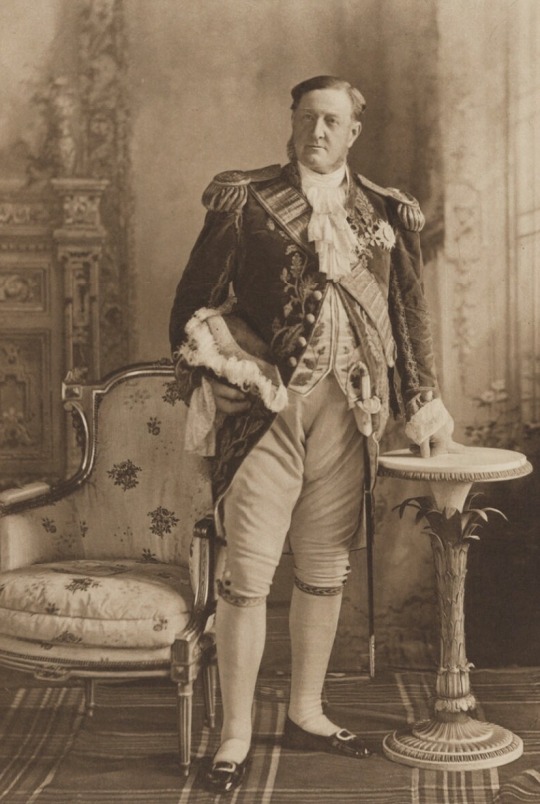

Costumes of Napoleonic figures at the Devonshire House Ball of 1897
1. Aileen May (née Wyndham-Quin), Countess of Meath as Hortense de Beauharnais, Queen of Holland
2. Princess of Löwenstein-Wertheim-Rosenberg (née Countess Josephine Kinsky) as Princess Pauline Bonaparte Borghese
3. Thérèse (née Kinsky), Countess Clary-Aldringen as Caroline Bonaparte Murat, Queen of Naples
4. Florence Anne (née Cole), Lady Delamere as Hortense de Beauharnais
5. Sir Charles Edward Cradock-Hartopp, 5th Bt as Napoleon I; Millicent Florence Eleanor (née Wilson), Lady Cradock-Hartopp (later Countess Cowley and Mrs Duberly) as the Empress Josephine
6. Lord Arthur Vincent Hay; William George Montagu Hay, 11th Marquess of Tweeddale; Candida Louise, Marchioness of Tweeddale as the Empress Josephine
7. Kathleen (née Douglas-Pennant), Viscountess Falmouth as Madame Recamier
8. Maria Henrietta Sophia Chaine (née Phipps) as Madame Sans Gêne
9. Henry Chaplin, 1st Viscount Chaplin as Marshal Lefevre
10. Catherine Dorothea Mary Grosvenor (née Simeon) as Marie Louise
#Devonshire House Ball of 1897#Devonshire Ball of 1897#ball#1890s#1897#napoleonic era#napoleonic#napoleon bonaparte#first french empire#french empire#Hortense de Beauharnais#pauline bonaparte#Caroline Bonaparte#josephine bonaparte#Marie Louise#Madame Recamier#Marshal Lefevre#costumes#costume#fashion history#historical fashion#Napoleon#Madame Sans Gêne#19th century#france#history#Devonshire#England#empire#empire style
101 notes
·
View notes
Text

Live broadcast of ‘Le Sacre de Napoléon V’ on the national channel Francesim 2, hosted by Stéphane Bernard


(Another journalist) The procession ascends the cathedral and reaches the choir. (Stéphane Bernard) Indeed, at the head of the procession, you'll notice the palace usher. He's closely followed by the heralds-at-arms, the Master of Ceremonies, the Grand Marshal, and most notably, by Prince Murat, who carries the Empress's crown.



(Stéphane Bernard) Here comes the Empress's procession, following behind the crown. She is surrounded by the women of the imperial family: Madame Mère, Madame Hortense, and the daughters of Prince Imperial Henri. In addition to the imperial mantle, the Empress wears the crown of Marie-Louise of Austria. (Another journalist) Why is the Empress already wearing a crown? (Stéphane Bernard) It's truly unprecedented, yes. During the ceremony, there's a moment dedicated to what we call the "regalia"… In truth, I'll tell you, this term wasn't really used back then. We talked more about ornaments or royal insignia. Deciphering all these symbols live… It's not easy, but… I would say that the Empress seems to be indicating that it's through her marriage that she acquired imperial dignity. As a result, today, she receives another crown: that of Francesim.

(Stéphane Bernard) His Holiness, Pope Gregorius XIX, takes his place near the imperial canopy, facing Their Majesties.

(Stéphane Bernard) And here comes the imperial procession advancing to the majestic sound of trumpets! Leading the way is the Grand Chamberlain, accompanied by the marshals of Francesim. He bears the cruciferous orb.

(Stéphane Bernard) Behind the Orb, Emperor Napoleon V advances in his Grand Habit de Sacre: a purple coat adorned with ermine fur. The laurel wreath of the Roman emperors rests on his head. The Emperor holds in his hands the scepters of Justice and of Charles V, and at his waist, rests the sword of Charlemagne, known as Joyeuse.

(Stéphane Bernard) His Majesty is surrounded by Their Imperial Highnesses, Prince Imperial Henri, and his son, Prince Philippe of Francesim. The procession is closed by the State counselors and members of the government.

⚜ Le Sacre de Napoléon V | N°9 | Francesim, Paris, 28 Thermidor An 230
The coronation ceremony begins in the choir of Notre-Dame de Paris cathedral. It was broadcast live on television by Stéphane Bernard, the famous journalist for the crowned heads in Francesim.
Beginning ▬ Previous ▬ Next
⚜ Traduction française
(Autre journaliste) Le cortège de l'Empereur remonte la cathédrale et rejoint le chœur. (Stéphane Bernard) Effectivement, en tête de cortège, vous remarquez l'huissier du palais. Il est suivi de près par les hérauts d'armes, le Maître de Cérémonie, le Grand Maréchal, et surtout, par le prince Murat qui porte la couronne de l'Impératrice. Car il s'agit aussi du sacre de l'impératrice.
(Stéphane Bernard) Voici le cortège de l'Impératrice, qui marche derrière la couronne. Elle est entourée des femmes de la famille impériale : Madame Mère, Madame Hortense, et les filles du prince impérial Henri. En plus du manteau impérial, l'impératrice porte la couronne de Marie-Louise d'Autriche. (Autre journaliste) Pourquoi l'impératrice porte-t-elle déjà une couronne ? (Stéphane Bernard) C'est vraiment inédit oui. Pendant la cérémonie, il y a un moment dédié à ce qu'on appelle les "regalia"... En vérité, je vous le dis, ce terme n'était pas vraiment utilisé à l'époque. On parlait plutôt d'ornements ou d'insignes royaux. Décrypter tous ces symboles en direct... N'est pas facile, mais... Je dirais que l'impératrice semble signifier que c'est par son mariage qu'elle a acquis la dignité impériale. De ce fait, aujourd'hui, elle reçoit une autre couronne : celle de Francesim.
(Stéphane Bernard) Sa Sainteté, le Pape Gregorius XIX, prend place près du dais impérial, en face de Leurs Majestés.
(Stéphane Bernard) Et voici le cortège impérial qui avance au son majestueux des trompettes ! En tête, le Grand Chambellan, accompagné des maréchaux de Francesim. Il porte l'orbe crucigère. Derrière l'Orbe, l'Empereur Napoléon V avançant dans son Grand Habit de Sacre : un manteau pourpre orné de fourrure d'hermine. La couronne de lauriers des empereurs romains repose sur sa tête. L'Empereur tient dans ses mains les sceptres de la Justice et de Charles V, et à sa taille, repose l'épée de Charlemagne, nommée Joyeuse.
(Stéphane Bernard) Sa Majesté est entouré par Leurs Altesses Impériales, le prince impérial Henri, et son fils, le prince Philippe de Francesim. Le cortège est fermé par les conseillers d'Etat et les membres du gouvernement.
#simparte#ts4#ts4 royal#royal simblr#sims 4 royal#sim : louis#sims 4 fr#sims 4#ts4 royalty#sims 4 royalty#coronation napoleon v#ts4 coronation#notre dame de paris#paris#episode iii#le cabinet noir#royal sims#ts4 royal family#ts4 royal simblr#sim : charlotte#sim : henri#sim : philippevictor#sim : marie joséphine#sim : hortense#sim : charlemagne#sim : jean#sim : stephane bernard
45 notes
·
View notes
Text
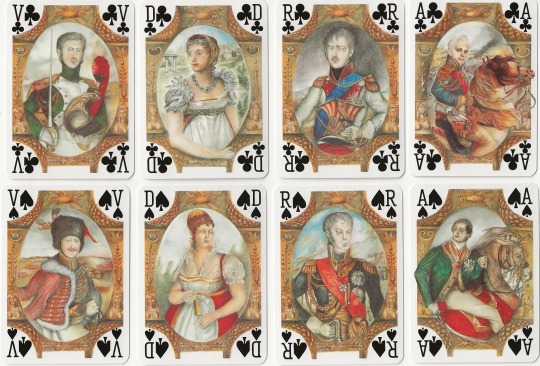

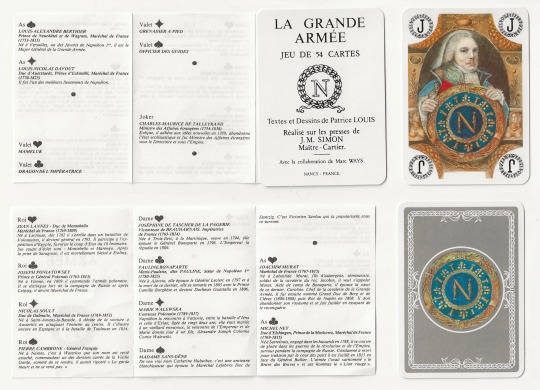
French Grande Armee Playing Cards with art and text by Patrice Louis
[Open images for better quality/readable text]
♣️ Dragon de l’ Impatrice, Pauline Bonaparte, Marshal Poniatowski, Marshal Ney
♠️ Officer Des Guides, Madame Lefebvre, General Cambrone, Marshal Berthier
♥️ Mamluk, Josephine, Marshal Lannes, Marshal Murat
♦️ Grenadier a Pied, Marie Walewska, Marshal Soult, Marshal Davout
I can’t find any other information about the artist except that he’s also illustrated other historical cards sets in the 1970s. I like how it’s a Grande Armee set with no Napoleon, and the people within the suits seem to have no particular connection to one another. It’s like the guy who made these was just choosing people that he liked.
27 notes
·
View notes
Text

It was now painfully clear that Paul and Olga must make their home permanently in Paris; but they needed a far more imposing residence and initially looked for somewhere near Versailles. Finally, they found the perfect home at L’Hôtel Youssoupoff at 2 avenue Victor Hugo, Boulogne-sur-Seine, in the 16th arrondissement. It had been built in 1860–61 for Princess Zinaida Naryshkina, widow of Prince Boris Yusupov, when she had remarried to Comte Charles de Chaveau and settled in Paris. When the princess died in 1893, Prince Nikolay Yusupov in St. Petersburg inherited the mansion, but it had been empty for more than ten years when Paul and Olga found it.

Olga at last had a project into which she could throw all her energies and bring to life the rarefied style of Belle Époque living and entertaining to which she aspired. In many ways the couple were archetypal Proustian figures: and indeed the Countess von Hohenfelsen gets a passing mention in the great French classic À la recherche du temps perdu (In Search of Lost Time), in which Marcel Proust’s fictional character Madame de Guermantes is described as having offended Grand Duchess Vladimir by making the social faux pas of wrongly referring to Countess von Hohenfelsen as “Grande-Duchesse Paul.” Paul gets a mention too, as the “good Grand Duke,” as do the high society personalities with whom he and Olga regularly associated: Prince and Princess Murat, the Comtesse de Portales, Lady de Gray, Vera de Talleyrand-Perigord, Prince and Princess Baryatinsky, Madame de Chevigné, the Comtesse de Greffulhe, and the poet Robert de Montesquiou—who appears in Proust as the “Baron de Charlus.” Despite the pain of separation from Russia and Paul’s children, as well as their son Vladimir—who had returned to St. Petersburg to train at the elite military school the Corps des Pages—Paul and Olga enjoyed a gilded exile with their two daughters, in a home created together that was “worthy of a Pompadour or a Du Barry

"After the Romanovs" - Helen Rappaport
#romanov#paul alexandrovich#imperial russia#imperial family#royalty#exile#royalty in exile#irina paley#natalia paley#vladimir paley#olga paley#belle époque#marcel proust#paris
12 notes
·
View notes
Text
Augustus Foster To Lady Elizabeth Foster. Paris, April 19, 1802.
I saw Massena and M‘Donald. The last resembles Lord Morpeth, I think; he is fair faced and gentlemanlike-looking. Massena is black-faced and seems a scoundrel. Buonaparte I still admire. His face was perfectly grave during the whole ceremony. After it was over he pleased everybody by his condescension in speaking to them. What was rather mockery, I think—I did not see it myself—but Camille Jourdan told me that he crossed himself several times as well as Cambaceres. That was trop fort for one once a professed Turc. Madame Buonaparte dresses very lightly; seems to have been pretty; she, with Madame Joseph, I think her daughter, and Madame Murat, her sister-in-law, and Louis Buonaparte with several ladies, was placed in a gallery a little above the altar on the left; she only came with two horses to her carriage.
Frederick Foster To (his son) Augustus Foster. Marseilles, Dec. 27, 1814.
My dearest Augustus. . . . We have seen Massena. He is, I believe, stingy, but very civil, and very interesting to see. Bonaparte on embarking for Elba sent him his amities, c'est un brave homme je l'aime fort—but Massena says he, Bonaparte, loves nobody; that once when he was ill, Bonaparte never took the least notice of him, never even sent to enquire, and that at another time, when he was also unwell, and that Bonaparte had need of his services, he used to come and see him three or four times a day. He thinks he was a man de grandes conceptions, particularly when things went on well, but that in adverse fortune he failed....yet Massena seemed to have a kind of liking for him; said that it was him who had named him I'enfant de la Victoire, and pointing to his great coat said he was happier when he bought that, it was at Vienna...Massena is much broken and altered from what I remember him at the peace of Amiens. He and Wellington met at Paris, and after a stare Massena said, "Milord, vous m’avez fait bien penser.” "Et vous, monsieur le Maréchal, vous m’avez souvent empêché de dormir." [Milord, you really made me think. And you, M. le Marechal, you often made me lose sleep.]
The two duchesses, Georgiana, Duchess of Devonshire, Elizabeth, Duchess of Devonshire, 1898
13 notes
·
View notes
Text
A brief talk about Fables and LGBT
When it comes to works dealing with oe re-creating fairy tales, I always like to take a look at any possible LGBT representation. After all, fairytales became such a monolithic symbol of a heterosexual world with no place for queer people that taking a look at non "orthodox" orientations is always one of the easiest but also deepest subversions of the genre. (There's a whole thing to say about the very strong queerness of literary fairytales from madame de Murat and the knight of Mailly to Andersen and Oscar Wilde, but we'll keep this for later - let us focus on the "popular opinion" and "random Joe or Joane" knowledge that "fairytales are for heteros only").
As such, I had to take a look at the LGBT representations in the comic book "Fables". Being one of the big names and great example of fairytale media, building an entire franchise on reinventing fairytales into a modern fantasy and marking the first American entries into the urban-fantasy fairytale world... And it is very interesting because in recent years "Fables" has come under heavy criticism precisely because of a lack of LGBT representation. You have this numerous series, that spawned numerous spin-offs, and co-existed with other great Vertigo titles filled with queerness (Neil Gaiman's Sandman to take an example)... And yet all people remember of it are "heteros everywhere". Is it true? Is Fables truly as queer-unfriendly as we recall?
This post originally began last year as a catalogue of all the queer characters in Fables... But I stopped halfway, realizing I was exhausting myself by just dissecting every little part of the comic. Not that I do not enjoy it - but I have better things to do on my free time. So instead of making a full and exhaustive list of every mention of non-hetero things, I will rather make some broad and general observations based on my knowledge and reading of this franchise.
If we look at the main series, we can only confirm this popular opinion: homosexual characters are neither primary nor secondary - they are tertiary at most. The only character I remember to have been truly confirmed as homosexual was Moss Waterhouse from "Jack Be Nimble". A very cool character - an intelligent, ambitious, charismatic, slightly morally ambiguous Black, gay and Jewish man who knows he is every minority the old world hates and doesn't hesitate to use it as a weapon, and ultimately gets the fame, the wealth and the power. A very cool character... that lasts a few issues and disappears completely. Beyond that... What do we have? Rose-Red says she had "experiences" with women before - but it is a detail thrown hastily in a dialogue of "Animal Farm", and it is unclear if she is truly bisexual, simply "experimented" in her past, or purposefully had lesbian relationships in her conscious and intense effort to break all the social taboos of the Fables community... I did notice a hairdresser that seems to be a "gay hairdresser" stereotype in "The Sons of the Empire", but after that, the series is a desert.
So, while Bill Willingham recognizes gay people exist, he clearly doesn't want to focus on them or talk about gayness in his plots. In fact, he seems to have been thinking more about them in the beginning of his comic (all the mentions above are from the first third or so of the series), before completely focusing on something else. There is not a refusal of depicting homosexuals, no, there is simply no desire to focus on them or push them forward or tell stories about them (except for Moss Waterhouse, who is a focus-character and one of the main characters of the Jack Be Nimble arc - but a tertiary character in Fables as a whole). [Note: I am only looking at here through the lense of inside the comic, but it doesn't help that Willingham is in real-life an openly Christian and old-fashioned author with some... specific ideas that do not really fit with modern sensibilities, resulting in some of the series' primary controversies, like the handling of abortion.]
HOWEVER! To say Fables is not a gay comic FRANCHISE would be a big mistake. Because while the main series is a desert with one oasis, the spin-offs are BURSTING with gay characters! Well, it isn't a Pride Parade still, but we have prominent, important, front-stage homosexual characters, and gay romances are part of the plots and character growths!
"Fairest" is probably the most gay of all the spin-offs : in "The Hidden Kingdom", Rapunzel is confirmed to be bisexual and a key part of the plot is her romance with a female kitsune. In "The Return of the Maharaja" Prince Charming is revealed to be bisexual and Nathoo (of The Jungle Book) to be gay. And in "Clamour for Glamour" Mary is in an homosexual relationship too... Not only are homosexual relationships openly depicted and primary characters confirmed as queer, but the topic of accepting these relationships is also heavily talked about - from Rapunzel facing the rejecting of a feudal Japan moral system, to Nathoo being afraid of his own feelings and Charming having to explain to him they are normal. What is especially interesting about "Fairest" is that the series seems to go at counter-flow against the main series. For example, Prince Charming is confirmed to be bisexual and to have loved at least a man before... But if I recall well, in the beginning of "Fables" Charming made clear he was NOT into guys, only girls. Another case could be brought up - Crispin, whose "gay-coding" was massively amplified in "Of Men and Mice" - in fact, it is very obviously and strongly suggested by the story that Crispin and the Huntsman are more than friends, given how the Huntsman rushes by his side and refuses to leave his hospital bed after the explosion... It is not openly said, leading to Wikipedia articles to go with the usual routine of "They're just good friends", but the way it is framed and having this "very strong same-sex devotional friendship" sandwiched between openly gay romances, it all VERY strongly implies some homoromantic feelings...
Another spin-off that deserves a good place on this list, but that is not well known (because A- it is the last of the spin-offs and B- it got cancelled due to low sales) is "Everafter", which explicitely confirms that Connor Wolf, one of the children of Snow and Bigsby, is not just homosexual, not just bisexual, but PANSEXUAL thanks to his extensive shapeshifting abilities allowing him to turn into all kinds of sexes, genders and species. And this isn't just told to us by dialogue, but also explicitely proven and shown by having Connor enter an homosexual relationship with one of his male colleagues, Tom Swift (from the Tom Swift novels).
So, what made this "queer boom" in the spin-offs? Was it because Willingham was less present, if not completely absent, allowing other voices to write and speak? Was it because it was "side-stories" that could be split from the "main stuff", and thus there could be more experiments? Was it because these series were made and written in the late 2000s and early 2010s rather than the late 90s, and so these subjcts were more on people's minds? Probably a mix of all that - after all, one thing well known is that the spin-offs were places of free experiments and competitive alternatives, resulting in contradicting plotlines that made the series semi-canons compared to Willingham's main continuity (see the dual Sleeping Beauty origin backstory).
The Fables franchise is not "anti-gay", far from it - I do hold the idea that fairytales are an inherently queer genre and so every work dealing with them for too long ends up showing queer themes at one point or another - even though it is true that the Fables SERIES is very, if not almost exclusively, heterosexual-driven. But the very open and normalized homosexuality, bisexuality and pansexuality of the spin-offs help balance this in the scope of a franchise.
Now, you might say: "Hey, you spoke of queerness at the beginning of your post, but now you're all rambling about sexualities! Where's the transgenders at?". And believe me, it was deliberate! Here is the thing - when it comes to trans folks, Fables becomes a whole other lot of complex topic. I do not know what Willingham's personal opinions of trans people are, and it doesn't really matter here because am looking at the actual created work as it can be received from someone with no knowledge of the author. Here's the thing: while the Fables main series is a desert of gayness, it develops a very strong transgender esotericism through focus on specific fairytale topics, reversal of fairytale tropes, and discussion of motifs that truly work as gender-breaking occultism. This is why anyone who reads some arcs of the main series can easily believe Willingham is trans-friendly (again I don't know if he actually IS, and from the rumors I vaguely heard, he might not be fully okay with trans people, but his work speaks a different language). If Willingham truly is against trans people, than this proves my point above: anyone dealing too much or for too long with fairytales in their work will grow queer-messages and queer-themes, that they want it or not.
On one side, you have numerous shapeshifters in this story who explicitely keep altering and changing their appearances and identities, which brings forward questions of "living into two worlds" (like the cubs, halfway between humans and wolves) or having to choose one identity other another. When this gets mingled with inhuman, cosmic entities and personified natural powers this results to some very interesting gender issues - most famous being the North Wind case. When there is talks of the North Wind getting an heir among his grandchildren, there is a whole discussion about how the North Wind will always be King of the North and of Winter... even if the new North Wind is a girl. Which, as the North Wind attendants say, lets the heir choose if they want to become male to match the title, or stay female while being called "King" - because ultimately the North Wind, being a seasonal and weather power, is above and beyond these gender considerations, and mostly uses them as attributes and titles more than anything of real substance.
On the other side, the topic of names is truly fascinating... Fables being iconic characters of popular stories, feeding off their fame and celebrity to gain power, means that they are deeply attached to their names, that their names are their essence and their being, and that these same names will keep haunting them. And yet... in the second half of the comic, we have numerous characters changing their names. Changes that not only mark deep personal growths and dvelopments, but also are accepted by others and change the perceptions of who the character is. When Flycatcher stops being a low janitor in deny, and decides to become a brave, powerful, messianic king, he returns to his original name of "Ambrose". Similarly, Frau Totenkinder when returning to her true self, abandoning the nicknames and disguises, gains a new identity so that the other Fables do not recognize her and mistake her for another person. And of course, there is how Stinky - who got a name he hated, not by choice - becomes Brock Blueheart, though this is here meant to be more of a religious allegory than anything else. But still - for anyone aware of his transgenderism works, to see this importance and focus on the power of names, of names as defining an identity, and of the changing of names to change who you are... It is hard not to see some trans motifs in the second part of the Fables comics.
But even more relevant, even more obvious, even more trans-coded, was the story of Rodney and June. This arc was the definitive proof that no matter what Willingham's personal opinions might be, Fables was a trans-friendly comic, even if maybe against the author's own intentions, or by accident. [Or again, purposefully if Willingham turns out to be cool with transgenders people, I don't know the guy]. Rodney and June, wood-soldiers, born out of trees, made of wood, part of an entire elite nation and civilization of wooden people... Are fascinated by people of flesh, dream of becoming flesh people, even if others see them as weird freaks and advise them to "keep all this hidden" not to compromise their reputation ; and their story is fully developed and fleshed out (no pun intended) from awkward and failed attempts at imitating and understanding the behavior of flesh-people (things like eating or kissing), to them openly and bravely undergoing a quest to demand that their creator grants their wish of becoming people of flesh, and be recognized as such by the empire they live in... When you read this story, it seems massively obvious that this is a barely-veiled plot for anyone dealing with identity issues and trying to change who they currently are to be true to who they want to be - and more importantly who they feel they have to be. You can't do more trans than that - from the whole "don't tell, keep it hidden" behavior of the awkward friends around you to the secret experiments and roleplayings in the privacy of the bedroom...
In conclusion: Next time someone says Fables is homophobic, point out to them that the comics themselves are not. The main series might not have prominent gay stories or characters, but it has some very strong transgender motifs and characters (accidental or not, they're here, they're queer and people have to deal with it) ; while the spin-offs are bursting with unashamed gay romances and explicit lesbian sex. It is definitively not the greatest franchise when it comes to gay representation, but it cannot be said it isn't a queer comic in its whole.
#fables#fables comic#queerness#gayness#transgender#analysis#queerness in fairytales#transgenderism in fairytales#fables spin offs
42 notes
·
View notes
Text
Catching up on Book Reviews #3: Contes de Fées Queer by Madame de Murat

Madame Henriette-Julie de Murat était une des femmes qui écrivaient des contes de fées vers la fin du 17ᵉ siècle. Elle était aussi une lesbienne. Dans cette édition de poche sont repris quatre de ses contes avec un sous texte queer fort. Étant donné l’époque quand elle écrivait, on ne peut demander rien de plus.
Je suis extrêmement contente que ce livre existe. Les conteuses ont été oubliées par la culture populaire, et il est bien temps de les redécouvrir. Il est aussi bien temps de redécouvrir les vieux écrivains queer, et ce qu’ils peuvent apporter aux membres de la communauté, aussi bien que toute autre personne intéressée à la littérature. Ainsi, ce livre sert aussi bien comme introduction à une autrice bien douée, comme il nous sauve l’effort de lire toutes ses histoires à la recherche d’un sous texte queer.
C’est un livre fort intéressant pour les fans de littérature classique, de contes de fées, aussi bien que les membres de la communauté, et j’aimerais bien remercier tous ceux qui ont travaillé pour nous le donner.
#j'espère juste qu'Amazon va l'accepter#ils n'aiment pas trop l'utilisation du mot queer...#ben fuck Amazon#mais aussi ce livre a besoin de plus de reviews#livres#livres français#contes de fées#Madame de Murat#Littérature classique
7 notes
·
View notes
Text
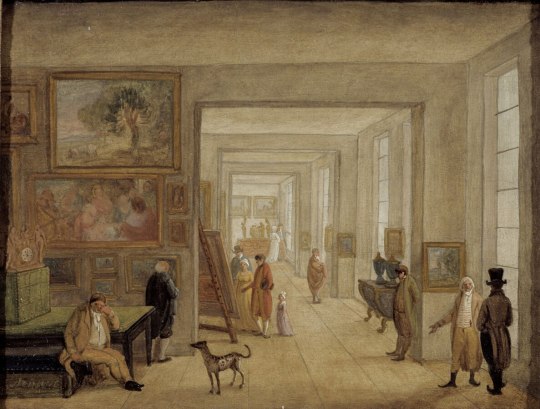
Jacques-Albert Senave - Sales rooms at the Elysée Palace in Paris in 1797 - 1797
The Élysée Palace (French: Palais de l'Élysée) is the official residence of the President of the French Republic. Completed in 1722, it was built for nobleman and army officer Louis Henri de La Tour d'Auvergne, who had been appointed Governor of Île-de-France in 1719. It is located on the Rue du Faubourg Saint-Honoré near the Champs-Élysées in the 8th arrondissement of Paris, the name Élysée deriving from the Elysian Fields, the place of the blessed dead in Greek mythology. Important foreign visitors are hosted at the nearby Hôtel de Marigny, a palatial residence.
The palace has been the home of personalities such as Madame de Pompadour (1721–1764), Nicolas Beaujon (1718–1786), Bathilde d'Orléans (1750–1822), Joachim Murat (1767–1815), and Charles Ferdinand, Duke of Berry (1778–1820). On 12 December 1848 under the Second Republic the French Parliament passed a law declaring the building the official residence of the President of France. The Élysée Palace, which contains the presidential office and residency, is also the meeting place of the Council of Ministers, the weekly meeting of the Government of France presided over by the President of the Republic.
Jacques-Albert Senave (1758–1823) was a Flemish painter mainly active in Paris during the late 18th and early 19th centuries. He is known for his genre scenes, history paintings, landscapes, city views, market scenes and portraits.
17 notes
·
View notes
Text
My reaction to the fact that Letizia Bonaparte reprimanded Caroline Bonaparte for her betrayal towards her brother
(This is not a very serious post, so if you’re looking for real historical analysis, run away.)

Here’s what the mother supposedly said to the daughter for the betrayal Murat and she committed against Napoleon: "If you couldn’t influence him, you should have at least opposed him. But what kind of opposition did you put up? Was any blood spilled? Only over your dead body should your husband have struck your brother, your benefactor, your master!"
My reaction: Well, madam, now you should have given this speech to your son, who betrayed the Jacobins by deporting many of them, and especially the Republic, without which he never would have risen to power. Or when he committed so many heinous acts worthy of a traitor, like the execution of Giuseppe Ceracchi in 1801—ironically, the same man who made a bust of Bonaparte in Milan in 1796. It seems that the poor man was tortured, as were most of the Jacobins executed (about ten of them) after a parody of justice even worse than that of 1793–1794. If only that was the only betrayal he committed... Anyway, I’ve already said in many posts why I hate Bonaparte. In any case, we can say that Caroline, in this instance, is truly her brother’s sister. XD She just gave him a taste of his own medicine.
However, it’s quite astonishing to see that Caroline Bonaparte is one of the most demonized members of the Bonaparte family, while the reality is much more complex than the "evil sister" often portrayed in many films. In truth, she was a friend of Hortense de Beauharnais, despite what the latter claims in her memoirs, if I’m not mistaken.
P.S. Don’t think I have any sympathy for Caroline, because I have none at all. I’m just forced to acknowledge that in films, she’s wrongly depicted as one of the "villains."
#napoleon#napoleonic era#caroline bonaparte#letizia bonaparte#not a serious post#although I think no less of it I must confess
6 notes
·
View notes
Text
The Metternichs about Junot
Metternich to Mme Metternich, 14 February 1810 It is with true sorrow that I take up my quill today. Your letter of 26 January contains one of the scenes that show us the people of 1792 and 1793 exposed and naked. Place a being like J[unot] in a very high position, he will drink blood without letting any misgivings stop him.
That’s Metternich reacting to the news of the scandal Junot had caused after having discovered the correspondence between his wife Laure and Metternich, proving they had had an affair. Metternich himself was not in Paris at the time but had left some time after the war of 1809 between France and Austria had begun, and in the meantime had taken over the ministry of foreign affairs in Austria. However, Lorel Metternich with the kids had stayed in Paris, and Junot had dragged her right in the middle of a scene of severe domestic violence that she immediately informed her husband of, with the help of a secret agent Metternich had in Paris, Benoit des Androuins.
Interestingly, Lorel Metternich at first does not mention any involvement of Caroline Murat in this event, she only lists her as one of the people gossipping about it.
Other than that, Lorel apparently behaved as prudently as she could once she had entered Junot’s house. According to the letter by Androuins, Junot had forced Laure to write a message to Lorel, urgently inviting her over. On entering, Lorel found Laure Junot crying on the sofa, hiding her face in both hands. - According to Laure’s own journal intime, the last hours had been a nightmare for her, including attempted rape and attempted murder. - Once Lorel Metternich was in the room, Junot locked the door behind both women and started to rage against Metternich, demanding Lorel take revenge upon him etc. The only thing Lorel answered was: "But you are mistaken, Monsieur le Duc. This is not my husband’s handwriting." - Despite the fact she had obviously recognized it. Again, according to Laure’s journal intime, she at some point managed to silently ask Laure if she could do something for her.
Despite Lorel’s calm reaction, the scene must have scared her a lot. At least she seems rather relieved to learn that the Junots were to leave the capital, when she writes to her husband:
Bluebeard has finally left with his amazon and, as I am assured, probably never to return.
"Bluebeard" obviously referring to Junot.
Edit: Forgot to add the source for the two letters: Conti, "Metternich und die Frauen", Vol. 1 - The description of what may (or not) have happened during the night when Laure was alone with Junot are a brief summary of the excerpts from Laure's "journal intime" quoted in Toussaint du Wast, "Laure Junot". It is to be noted that this "journal intime" may have been written years after the event for Balzac, and that it is per se unverifiable.
However, Lorel Metternich calling Junot "Bluebeard" at least strongly hints at her, too, being convinced that Junot had physically abused and possibly tried to murder Laure.
Edit II: On second reading, I added an "attempted" to the accusation of rape. Of course, by the reasoning of the law at the time, rape in the judicial sense would not even have been possible between spouses. Obeying to the husband's needs was the wife's job. - As to Laure's "journal intime", she describes that Junot tried to force himself on her, but claims that she managed to make him stop. (I am not sure I fully believe her.) Junot then at some point attacked her with a pair of scissors, wounding her, before trying to strangle her. He only stopped when Laure was close to loosing consciousness and when he literally saw her blood on his hands. That's how Madame Metternich found Laure on entering.
56 notes
·
View notes
Text
MALMAISON MEDIA SALON SOIRÉE 21: THE ACADÉMIE (2012)

1. The Introduction
Welcome, welcome, welcome! Did you miss me?! I missed you too!
Life has been hectic, but I’m back with a review of a book I came across by accident while browsing Goodreads. The setting of Madame Campan’s school isn’t used that much and has a potential, so of course I was interested.
The book itself is seemingly only available for purchase so far. On websites like Amazon that is. I couldn’t find it in the database of archive.org at least. But perhaps someone will upload it in the future.
Anyway, I’m always a sucker for more obscure media, so let’s proceed with the review already!
(Dedicated to @pobodleru and @josefavomjaaga )
2. The Summary
“Eliza Monroe, daughter of a wealthy Virginia lawyer, is sent to France by her family to get a better education fit for a lady.
At the school, she is quickly roped into manipulation games between two bitter enemies: Hortense de Beauharnais and Caroline Bonaparte.
Each of the girls will also experience love, betrayal and many other aspects of growing up.”
Coming of age stories are a classic for a reason, so let’s see how this concept is executed!
(Trigger warning for mentions of physical abuse, murder and suicide.)
3. The Story
First of all, there are too many POVs. Eliza, Caroline and Hortense EACH have their own POV chapters, where they narrate their side of the story in first person.
While this concept of switching between POVs could potentially work, the problem here is that there is too much switching, which gets very annoying and confusing. Basically, too damn much of a good writing device.
Secondly, for a fairly interesting premise, the story doesn’t do squat with it for two thirds of the book. Eliza doesn’t pick sides, characters don’t develop properly and the love subplots don’t get resolved.
For two. Fucking. THIRDS. Of the book!
The conflicts only get sort of resolved in the final third of the book, which, as you can probably imagine, just isn’t enough time to do it properly. And guess what! The author DROPS THE BALL WITH THE RESOLUTION and, as a result, nothing makes sense like she pulled the resolution out of her ass.
Another side effect is that the characters barely change at all over the course of the story, when growing up after facing adversity is the entire point of a coming of age story!
Which brings us to…
4. The Characters
I don’t like Eliza Monroe. The problem isn’t that she is a bratty teenager, by the way. The problem is that she doesn’t change over the course of the story and barely has agency, especially in the beginning.
Hortense and Caroline just play her like a fiddle most of the time, while Eliza herself just waits for something juicy to happen so she can gossip with her mother via letters.
Eliza is just a character blander than unseasoned oatmeal.
Caroline Bonaparte, as usual, is the bad guy. She is a selfish, manipulative cunt who only cares about herself and MAYBE Murat. Then she suddenly speed runs a sort of a redemption arc in the end, and even then it’s ambiguous if it was genuine or not.
Hortense de Beauharnais is supposed to be the good character, depicted by the narrative as better than Caroline in every way and almost beatified by the story.
Unfortunately, this makes her lack depth too and makes it very jarring when she does really shitty things, like trying to drive a wedge between Eugéne and his love interest due to believing that said love interest is unworthy of her brother and should know her place.
She never gets called out on her bullshit either! Our saintly Hortense, Neighbors! Oh, and she has an inappropriate relationship with her stepfather! Or well, implications of such a tryst.
Eugéne is a cinnamon roll personified. At least, until her accidentally kills his love interest, Madeleine. Supposedly, this happens because Madeleine is unstable due to enduring abuse and pining for Eugéne, yet all that happens is that she gets conveniently killed off by Eugéne and we never get to see if she truly was unstable or not. We are TOLD this, but not shown evidence.
By the way, Madeleine had the most potential out of all the important characters. An aspiring biracial actress horribly abused by her jealous, drug-addicted mother and pining for Eugéne, hoping to be rescued like in a fairy tale.
Madeleine is depicted fairly realistically, in my opinion, but then she is suddenly killed off to conveniently resolve the conflict of Josephine not accepting her as a match for Eugéne. No buildup, no significant consequences, ZILCH! Only Eugéne seems shaken by her death, but we aren’t really shown much of this either, merely TOLD.
Josephine, while definitely capable of kindness, has her own selfish bitchy moments, like not giving a fuck that Madeleine died or that Eugéne is shaken up by accidentally killing her. Her own past as a slave owner is also mostly conveniently omitted and she isn’t shown as being called out for it, unlike Eliza, who IS called out for thinking slavery is normal.
Letizia Bonaparte is a scheming snake just like Caroline, almost to cartoonish levels.
Napoleon Bonaparte is a stereotypical shortie, and also almost being a pervert to his stepdaughter. Ewww…
Madame Campan is a stereotypical kind and strict mentor.
So yeah. Most characters don’t feel interesting at all.
5. The Setting
The setting is mostly just mediocre, with occasional common cliches like claiming Robespierre REIGNED in France or that nobility during Frev was automatically in danger. But these are far from the worst offenders, so eh.
The descriptions are surprisingly good though, in that they are integrated into the book in a balanced way, so here at least one win for the author!
6. The Writing
Problems with the writing start WITH THE TITLE. More specifically, combining French spelling of a noun with an English article. “THE ACADÉMIE”, “THE TERREUR”, etc.
It’s unjustified and clunky at best. At worst, it looks like the author is just throwing in French words because the book is set in France. I would understand if it was a foreign character trying to show off and making these weird mistakes, but ALL CHARACTERS speak like that!
It’s… definitely an odd choice.
Other than that, however, a bit of props to the author for at least trying to write realistic bratty teenagers.
7. The Conclusion
Honestly, this book isn’t the worst I’ve ever seen. Not by a long shot. However, I would still recommend to give it a hard pass. It’s not bad. Not even so bad that it’s funny. And not even rage inducing.
Just… meh. Bland. Nothing to write home about.
On that note, I declare this Soirée at the Malmaison Media Salon as finished. Hope you stay tuned for more future reviews though!
Love,
Citizen Green Pixel
#eliza monroe#caroline bonaparte#hortense de beauharnais#louis bonaparte#napoleon bonaparte#josephine bonaparte#letizia bonaparte#madame campan#malmaison media salon#the académie
5 notes
·
View notes
Text
“This even seems a bit like pimping.”
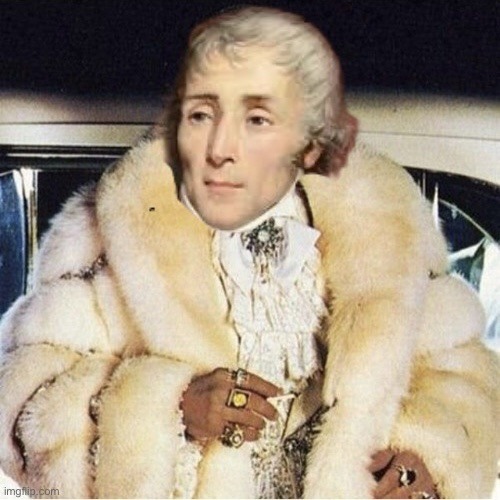
But the princely couple in which he will be most interested is that of Joachim Murat and Caroline, the most ambitious of Napoleon's sisters with Élisa. “Impressive in her pretensions,” Claire de Rémusat says of her, still dreaming of a throne as the Grand Duchess of Berg at the beginning of the Empire. At odds with Talleyrand, she very quickly sensed the services that Fouché could render her and entered into his intimacy. "She bound him to her by a host of little confidences," Madame de Rémusat goes on to say. Fouché allows himself to be approached with pleasure and does not miss an opportunity to be useful to her by placing his proteges in her service: "I am too zealous to do what can be useful to Your Imperial Highness,” he wrote to her about one of them. “[…] I will eagerly seize the first favorable opportunity.” There are a thousand of other such examples like this. He flatters the wife, but he also flatters the husband. We will never know how far this man's indulgence went when it was useful to his interests. In August 1805, he certainly acted as intermediary between Murat and the beautiful Juliette Récamier, Madame de Staël's friend, who turned all heads and in whom Napoleon's brother-in-law took a close interest. Lucien had already fallen in love with her at the start of the Consulate. It nearly became a family affair. We find in the private letters of Fouché to Murat sentences of this kind: “I have undertaken to fulfill the mission that Your Highness has entrusted to me. I presented my compliments to Mme R[écamier]. She sent me a letter in reply, which I have the honor to address to you.” This even seems a bit like pimping. At the same time, the former member of the Convention did everything to persuade the beautiful Juliette to enter the service of Caroline Murat, who at the time already had a court and "ladies for accompaniment." It would have made the husband's business easier. He would not succeed, despite the arrangement of a timely visit by Juliette Récamier to the Château de Neuilly where Caroline Murat was then residing. It never ends with Fouché. For years he would shower Caroline with praise, especially from 1808, when she became Queen of Naples. "She is further embellished on the throne and she knows how to spread charms, even in the circles of her court," he wrote to her husband in 1809. “We hope she does not quite become Neapolitan, and keeps a memory for the Parisians who think a lot about her and who will miss her all their lives.” As he moves away from Joséphine, he gets closer to the Murats, who detest her. They took his side strongly in the divorce affair, and Joachim did not miss an opportunity to support him with Napoleon. Caroline will be flattered to have as sister-in-law a descendant of one of the great sovereign houses of Europe. This will bolster her ambitions. In Fouché's eyes, Murat is popular and easy to maneuver. From 1807 and again in the last months of 1808, he was for him the ideal candidate, if by chance Napoleon were to die in Spain. When Murat came to the throne of Naples in August, he orchestrated a veritable propaganda campaign to his glory in the press. This will also be complained of in the entourage of Napoleon. “Fouche said loudly that he alone could succeed the Emperor, that he alone would inspire the necessary fear in Europe; that he alone enjoyed the confidence of the military.” For his part, the new King of Naples has every reason to be unhappy. He wanted to be king in Poland in 1807, then king of Spain in 1808. Naples is for him only a last resort, at worst a measure of separation. He also complains of being kept on the margin by Napoleon, who does not let him govern as he pleases, and Caroline continues to stir up his ambition. But Murat is only one card in Fouché's game. He is a joker in the event of a hard blow.
—Emmanuel de Waresquiel, Fouché: Les silences de la pieuvre, 2014.
48 notes
·
View notes
Text
Caroline Bonaparte rumored to be the model for La Grande Odalisque
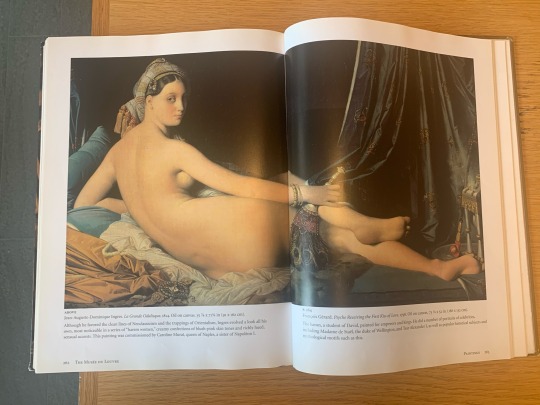
[La Grande Odalisque, Jean-Auguste-Dominique Ingres, 1814. Commissioned by Caroline Bonaparte, Napoleon’s youngest sister]
Excerpt from Ingres: Painting Reimagined, by Susan L. Siegfried
The Grande Odalisque exploited the balance between ideal figures and portraits in its artistic models and pushed that equilibrium to the limit. It was easily destablized by the directness of the odalisque’s gaze, even though the face was an idealized Raphaelesque type. Indeed, Ingres was unable to control rumors that he had portrayed Caroline Murat in the Grande Odalisque […]
The rumors were hardly surprising. Caroline Murat’s kinship with Pauline Borghese must have incited speculation, especially among enemies of the Bonapartes in Italy, about the Bonaparte women’s taste for disguised portraits of themselves in the nude.
[Pauline Bonaparte as Venus, by Canova]
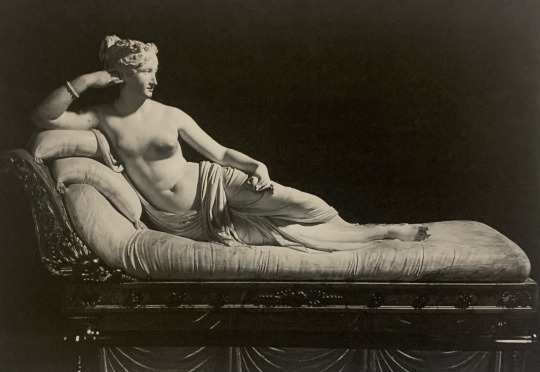
Moreover, in the eighteenth century the king’s mistresses used to commission portraits of themselves in the guise of sultanas, as did Madame de Pompadour in A Sultana Drinking Coffee by Carle Van Loo (1752, The State Hermitage Museum, St. Petersburg), so there was precedent for thinking that a “parvenu princess,” if not a mistress, may have followed suit. […]
Another ornament with a story behind it is the large and distinctively coiled bracelet worn by the Grande Odalisque. This bracelet closely imitates one in Giulio Romano and Raphael's portrait of Doña Isabel de Requesens i Enriquez de Cardona-Anglesola, known in the early nineteenth century as Raphael's portrait of Jeanne d'Aragon. Vasari identified the sitter as the vice-queen of Naples, and Ingres would easily have made the connection to the new queen of Naples, Caroline Murat.



He owned an engraving of the portrait, and he was also thinking about portrait painting at the time, since the occasion for his visit to the Royal Palace of Naples was portrait commissions of the Murat family. To identify Caroline Murat by means of a bracelet may seem obscure, and that is perhaps the case. However, Ingres’s study of ancient costume had taught him that particular articles of clothing were invested with meaning: for example, he had traced the entire history of ownership of the necklace of Eriphile, a work of Vulcan that was passed on by Venus and had dire consequences for whoever owned it.
#Jean-Auguste-Dominique Ingres#Ingres#Jean Auguste Dominique Ingres#La Grande Odalisque#Grande Odalisque#napoleon#napoleonic era#napoleonic#napoleon bonaparte#Caroline Bonaparte#Caroline#Caroline Murat#Napoleon’s sisters#Napoleon sister#first french empire#19th century#french empire#Naples#Italy#French art#louvre#art history#history of art#Susan L. Siegfried#Siegfried#Ingres: Painting Reimagined
11 notes
·
View notes